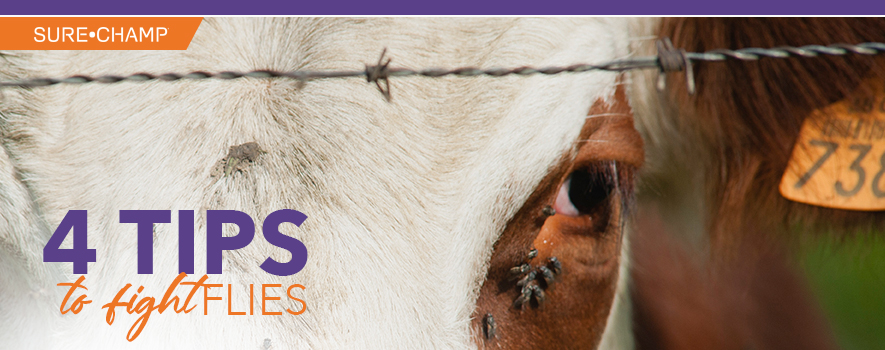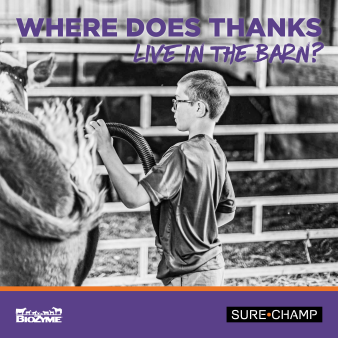
What’s the buzz? Well, this time of year, the buzz you are hearing can only be one thing, flies. As temperatures rise, bugs and particularly flies begin to repopulate, and it doesn’t matter which species of livestock you show, pesky flies are a nuisance to everyone. They like to invade our barns, bite at our animals and can carry diseases. With proper prevention including barn management, daily care and good nutrition, you can do your best to limit your number of unwanted guests this summer.
- Scoop the Poop
Flies breed and thrive in manure. So, the first step to total fly control is keeping your pens and barn as clean as possible. If you tie your cattle in their pen, make sure you clean their stalls regularly. If cattle are in a cooler, the temperature-controlled environment should help reduce flies already, but go a step further and limit the amount of time you are going in and out of the door, so flies don’t get inside. For smaller species like pigs, sheep and goats, be sure to pick the pens throughout the day if you can, in order to keep fresh waste away from the animals. Also consider scooping out any urine-soaked bedding. The longer it sits, the more the ammonia smell will attract flies. When all of the feces and urine is cleaned out of the pen, you should haul the waste as far away from your barn as you can. The closer it is to the barn, the closer the flies will be. Taking it away ensures flies won’t have a breeding ground to reproduce near your barn.
- Spray at the Source
Depending on your location and the humidity, you might want to spray an insecticide around your premises to keep flies and other insects from making themselves a permanent home in your barn. If you have the means, and flies are big problem because of weather or number of animals in the barn, consider investing in a fly control system that mists insecticide throughout the barn on a timed system. These will help a lot with eliminating flies and are common in pig, horse and large cattle barns.
If you don’t want to spray an insecticide, there are also some other tools you can look into for your barn, such as hanging fly traps, sticky paper or an electric trap. You could also consider poisonous fly bait on the ground, but keep in mind this could be dangerous if livestock were to consume it or if you have other four-legged helpers running around like dogs or cats.
- Spray the Victim
Spray isn’t just for your barn and the premises. There are also many livestock sprays on the market that are safe and effective to use with a variety of animals to keep the flies away. Be sure to read and follow the label directions and use accordingly. Also pay attention to how much of it you put on if it is an oil-based product. Too much of it can cause your animal to get hotter and more uncomfortable.
- Fight Flies with Feed
Did you know you can help control flies in your cattle, sheep and goats while you feed your animals? Sure Champ® Extreme with Climate Control is a pelleted, daily supplement that contains garlic, to deter insects. Just like all our Sure Champ Products, Sure Champ Extreme comes with the Amaferm® advantage to promote appetite and digestive health. Extreme also includes ingredients designed to help support animals during extreme temperatures and support hoof and coat care. By feeding Extreme, you should see fewer flies landing on and biting your animals, all while keeping their digestive system healthy.
Flies are inevitable when you raise livestock. You can’t expect to eliminate every single one of them. However, when you plan ahead and take a proactive approach with your management and feeding routine, you can greatly reduce your risk of fly overload. Less flies = less pests, less pests = happy livestock, happy livestock = healthy livestock EVERY. DAY.

